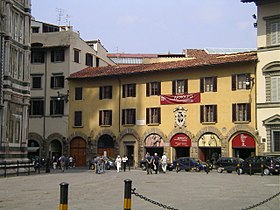Loading AI tools
Art museum in Florence, Italy From Wikipedia, the free encyclopedia
 The museum, seen from the Piazza del Duomo | |
 | |
| Location | Piazza del Duomo 9, Florence, Italy |
|---|---|
You can help expand this article with text translated from the corresponding article in Italian. (November 2022) Click [show] for important translation instructions.
|
The Museo dell'Opera del Duomo (Museum of the Works of the Cathedral) in Florence, Italy is a museum containing many of the original works of art created for Florence Cathedral,[1] including the adjacent Florence Baptistery and Giotto's Campanile. Most of the exterior sculptures have been removed from these cathedral buildings, usually replaced by replica pieces, with the museum conserving the originals.
The museum is located just east of the Duomo, near its apse. It occupies the area where much of the sculpture it houses was originally carved, as well as pieces such as Michelangelo's David, which was commissioned for the cathedral (this is now in the Galleria dell'Accademia).[2] It opened as a museum in 1891, and now houses what has been called "one of the world's most important collections of sculpture."[3]
Between 2009 and 2015 the museum considerably expanded, taking over the adjacent old Teatro Nuovo ("New Theatre") building. This allowed the construction of large display frameworks copying the architecture of the cathedral, into which the museum's originals are placed at their appropriate positions.
As of April 2023, the director of the museum is Fr. Timothy Verdon, an American priest who has held the position since 2011.[4]

Among the museum's holdings are Lorenzo Ghiberti's doors for the Baptistery of Florence Cathedral called the Gates of Paradise, the two cantorias, or singing-galleries, designed for the cathedral, one each by Luca della Robbia and Donatello. All these have been replaced by replicas at the cathedral.
The cathedral holds the originals of important early 15th-century sculptures for the exterior by Donatello (including the Zuccone), Ghiberti, Nanni di Banco, Nanni di Bartolo (il Rosso), Niccolò di Piero Lamberti and others.
The collection also includes The Deposition, a pietà sculpted by Michelangelo which he intended for his own tomb, and Donatello's wood Penitent Magdalene.
Although it was reported on August 6, 2013, that a tourist had accidentally snapped a finger off of a 14th-century statue of the Virgin Mary by Giovanni d'Ambrogio, the finger was from a later repair and not part of the original work.[5]
The museum also has significant collections of paintings (mostly late medieval and Early Renaissance), illuminated manuscripts, textiles in the form of vestments, metalwork and church plate, micromosaics and reliquaries.

Seamless Wikipedia browsing. On steroids.
Every time you click a link to Wikipedia, Wiktionary or Wikiquote in your browser's search results, it will show the modern Wikiwand interface.
Wikiwand extension is a five stars, simple, with minimum permission required to keep your browsing private, safe and transparent.